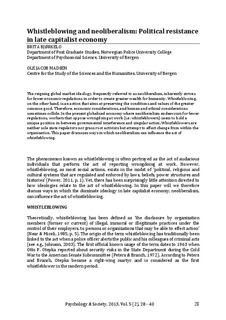Whistleblowing and neoliberalism: Political resistance in late capitalist economy
| dc.contributor.author | Bjørkelo, Brita | |
| dc.contributor.author | Madsen, Ole Jacob | |
| dc.date.accessioned | 2013-05-22T11:36:27Z | |
| dc.date.available | 2013-05-22T11:36:27Z | |
| dc.date.issued | 2013 | |
| dc.identifier.issn | 2041-5893 | |
| dc.identifier.uri | http://hdl.handle.net/11250/174704 | |
| dc.description.abstract | The reigning global market ideology, frequently referred to as neoliberalism, inherently strives for fewer economic regulations in order to create greater wealth for humanity. Whistleblowing, on the other hand, is an action that aims at preserving the conditions and values of the greater common good. Therefore, economic considerations, and human and ethical considerations sometimes collide. In the present globalised economy where neoliberalism endeavours for fewer regulations, workers that oppose wrongdoing at work (i.e. whistleblowers) seem to hold a unique position inbetween governmental interference and singularaction. Whistleblowers are neither sole state regulators nor grass root activists but attempt to effect change from within the organisation. This paper discusses ways in which neoliberalism can influence the act of whistleblowing. | no_NO |
| dc.language.iso | eng | no_NO |
| dc.publisher | Psychology & Society | no_NO |
| dc.subject | whistleblowing | no_NO |
| dc.subject | neoliberalism | no_NO |
| dc.subject | capitalism | no_NO |
| dc.subject | deregulation | no_NO |
| dc.subject | change | no_NO |
| dc.subject | influence | no_NO |
| dc.subject | varsling | no_NO |
| dc.subject | nyliberalisme | no_NO |
| dc.subject | kapitalisme | no_NO |
| dc.subject | deregulering | no_NO |
| dc.subject | endring | no_NO |
| dc.subject | påvirkning | no_NO |
| dc.title | Whistleblowing and neoliberalism: Political resistance in late capitalist economy | no_NO |
| dc.type | Journal article | no_NO |
| dc.type | Peer reviewed | no_NO |
| dc.source.pagenumber | 28-40 | no_NO |
| dc.source.volume | 5 | no_NO |
| dc.source.journal | Psychology & Society | no_NO |
| dc.source.issue | 2 | no_NO |
